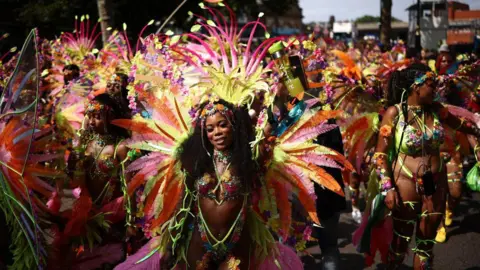The future of the Notting Hill Carnival, one of the largest street festivals in Europe, is currently at risk due to a lack of funding. Organisers of the renowned carnival, which attracts approximately two million participants each year during the August Bank Holiday weekend, have raised alarms about the event’s viability in a letter reportedly leaked to the BBC. The letter, penned by Ian Comfort, the chair of the carnival, is directed to Culture Secretary Lisa Nandy, emphasizing the urgent need for government support to ensure the survival and safety of this iconic celebration.
Comfort articulated that the festival requires “immediate funding” to address significant public safety issues that were highlighted in a recent safety review. This review indicated “critical public safety concerns” that compel the carnival’s organisers to seek additional financial resources. Matt Twist, Assistant Commissioner of the Metropolitan Police, had previously expressed apprehensions surrounding the potential for a “mass casualty event” if the current conditions regarding crowd density are left unattended.
The increasing pressures on the Notting Hill Carnival follow a comprehensive review, commissioned and funded by the Greater London Authority (GLA), along with Kensington and Chelsea and Westminster councils, costing around £100,000. Comfort pointed out that the London Assembly’s report from April 2025 sheds light on the mounting strain imposed on the Metropolitan Police during substantial public events. He cautioned that the resources available to law enforcement are insufficient to manage the operational demands that have escalated in recent years.
Despite the organisers’ past success in garnering substantial support for stewarding operations from the GLA and local councils, it has become evident that these bodies are no longer able to meet the rising operational demands identified in the safety review. Comfort further noted that a well-coordinated approach backed by adequate funding is vital for safeguarding attendees and fulfilling operational requirements of the carnival, which is considered a major national event.
Interestingly, the request for government funding would mark a significant turn in how public events in the UK are financed, moving towards direct support for an event that has traditionally relied on local funding and sponsorship. The Culture, Media, and Sport Department has been approached for a response to this urgent plea, but no formal statement has yet emerged.
As detailed in previous observations by officers, a considerable number of law enforcement personnel—about 7,000 officers—were deployed for the 2024 carnival, highlighting the operational complexity and challenges posed by the event. Twist’s comments to the London Assembly Police and Crime Committee reflected a growing concern that, while crime around the event captures attention, the greatest worry should be the crowd control and ensuring public safety amidst dense gatherings.
The London Assembly committee’s findings resonate with Comfort’s concerns, indicating that while the Met is being stretched thin during Carnival, there has yet to be a corresponding increase in government funding to aid their extensive efforts in safety and management.
The carnival has often been supported by different governmental bodies, including the Arts Council England, but this appeal for direct funding is crucial in light of escalating operational demands and the heightened public safety risks associated with such an expansive event. The negotiations concerning this funding are critical, as failure to secure it could endanger both the future of the Notting Hill Carnival and the safety of its attendees.
In summary, the Notting Hill Carnival stands at a precarious juncture, where the implications of insufficient funding and inadequate safety measures could threaten its storied legacy. The organisers remain hopeful that a coordinated effort will alleviate the increasing pressures and secure a safe, vibrant celebration of culture for years to come.



